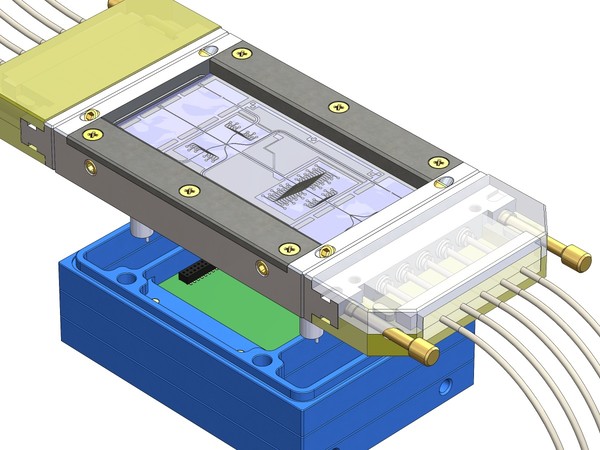Scientists from the UP Faculty of Science Department of Analytical Chemistry have launched a new project called MicroArch, which aims to create a unique “Meccano set” for working with microfluidics. This promising technology can precisely control the flow of very small amounts of fluids and is therefore used in the development of new drugs, in disease diagnosis, in environmental testing, in cutting-edge chemical and biological research, and more.
The project is supported by the Technology Agency of the Czech Republic (TA CR) through the SIGMA programme. Its commercial development and market launch are supervised by the Palacký University Science and Technology Park.
Microfluidics is a discipline that studies and utilises the movement of very small amounts of liquids in miniature channels, often as thin as a human hair. Essentially, it is a laboratory on a chip, where the chemical and physical processes under investigation take place on a small plate. Drops of liquid flow through it and chemical or biological reactions take place there. This makes it possible to perform rapid tests, develop new drugs and test their effects on cells, analyse very small samples, and simulate processes that would take much more time and space in a conventional laboratory.
“Whenever scientists want to test a new idea of theirs, they have to go through the complicated process of developing necessary electronics and software, because nothing suitable is currently available.” Oleksandr Prystopiuk
Microfluidics-based technology is playing an increasingly important role in laboratories and industry. However, one major problem is preventing the faster implementation of this method in practice: there is a lack of universal development kits on the market that would allow scientists and companies to assemble more complex devices and test new applications on them. “Whenever scientists want to test a new idea of theirs, they have to go through the complicated process of developing necessary electronics and software, because nothing suitable is currently available. And this has created a significant bottleneck for them. We therefore decided to develop our own solution to fill this gap,” said Oleksandr Prystopiuk, the project’s principal investigator from the Department of Analytical Chemistry, whose research and development efforts were supported by a grant from the UP Endowment Fund in 2024.
A construction set to speed up research
The result of the project will be a three-level construction set that will allow users to assemble their own miniature laboratory. It will be based on microfluidic devices, i.e. small chips in which tiny amounts of fluid flow. These will be connected to modules linking the chips to electronics and controls. The entire system will be managed by a platform that can simultaneously control several modules and connect them to a computer. “This will allow users to build their own ‘miniature laboratory’ and quickly develop new ideas and experiments,” says Prystopiuk.
The MicroArch project will last 18 months and will be divided into three phases. First, market research and customer needs assessment (Proof-of-Market) will take place. These will be followed by the development of a prototype and demonstration application (Proof-of-Concept). In the final phase, the functionality of the entire technology will be tested in a real environment (Proof-of-Delivery). “The goal is to offer universities and companies a practical set that will facilitate research and development of new technologies in medicine, pharmaceuticals, industrial quality control, and so on,” said Petr Bednář from the Department of Analytical Chemistry.
The analytical chemistry team led by Prystopiuk is working on the technical solution together with Jakub Havlín, project manager at the UP Science and Technology Park.
The call for PoC projects under the TA CR Sigma programme is still open. The programme provides support for the verification and development of innovative solutions (know-how, technology). The Knowledge and Technology Transfer Department at the UP Science and Technology Park will provide support, market and patent research, feedback, and evaluation to interested researchers. The aim of the programme is to identify technologies with commercial potential and prepare them for market use. This call is open to both researchers and doctoral students with innovative ideas. If you are interested, please contact the UP Science and Technology Park.
